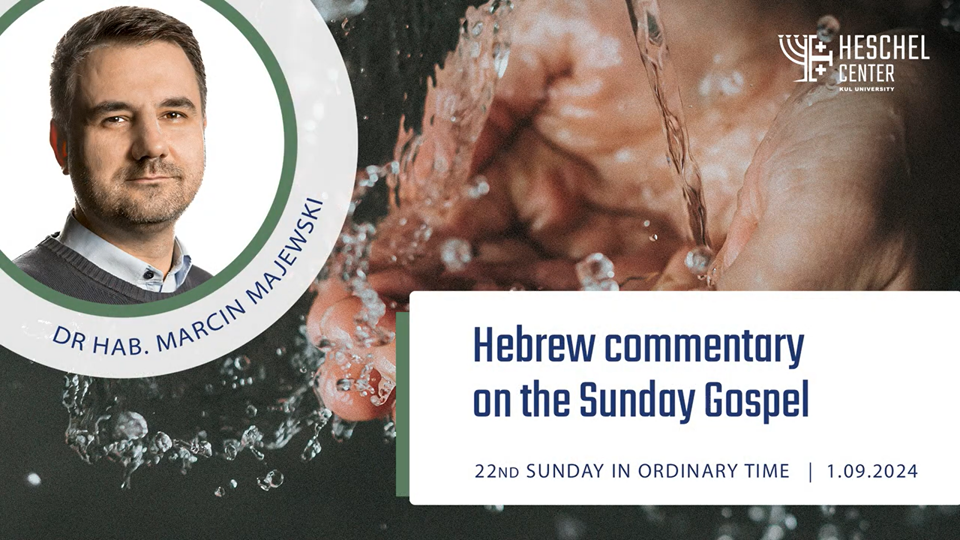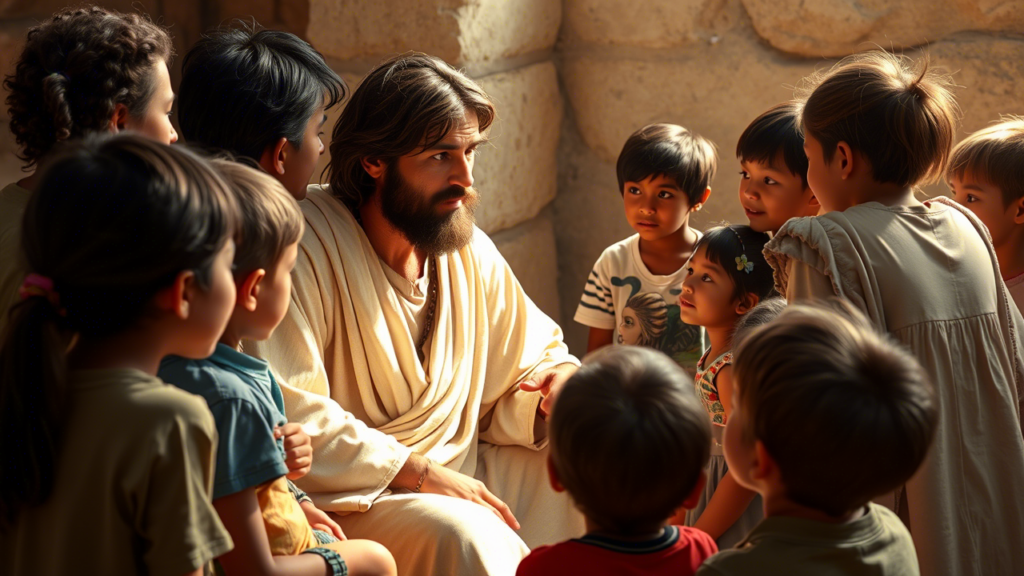Heschel Centre for Catholic-Jewish Relations at the Catholic University of Lublin
31 August, 2024
4 min
Clean or unclean things? Jesus responds
“The scene in today’s Gospel deals with a vital topic: Jesus’ attitude towards unclean things, commonly considered unclean in Jesus’ time”, stresses Marcin Majewski, biblical scholar, PhD in theology, professor, and lecturer at Pope John Paul II University and Jagiellonian University, in his commentary for the Catholic University of Lublin Heschel Center for the Sunday, […]

“The scene in today’s Gospel deals with a vital topic: Jesus’ attitude towards unclean things, commonly considered unclean in Jesus’ time”, stresses Marcin Majewski, biblical scholar, PhD in theology, professor, and lecturer at Pope John Paul II University and Jagiellonian University, in his commentary for the Catholic University of Lublin Heschel Center for the Sunday, September 1.
The scene in today’s Gospel deals with a vital topic: Jesus’ attitude towards unclean things, commonly considered unclean in Jesus’ time.
Here are Jesus’ disciples eating a meal with unwashed hands. The Pharisees, who are also Jesus’ guests, get offended: how can they do such a thing… It is not about unwashed hands before the meal. It’s about unwashed hands – this is not a hygienic rule but a legal and symbolic rule. There’s a big difference. The Pharisees and many Jews in Jesus’ time scrupulously observed the command to wash their hands before meals. Especially Jews living in the Diaspora – that is, dispersed outside the Holy Land – washed their hands. Perhaps the Greek influence is evident here – as evidenced by min. Letter of Aristeas from Alexandria in the second century BC. In the letter, we read, “According to custom, the Jews washed their hands, and when they had prayed to God, they set about reading and explaining.”
The washing of the hands was to remove ritual impurity. However, impurity caused by what here? In the Bible and the Torah, there is no mention of such a rule, such as the necessity of washing hands before meals. This rule is not derived from the Torah (written Torah) or the Tanakh – the Hebrew Bible! Nowhere in the Bible is there a command to wash one’s hands after returning from the market (and this is the case mentioned in the text of today’s gospel). Uncleanness is associated with touching the realm of death (the dead, the cemetery) or the realm of blood. What made a person unclean after returning from the market, and why did he have to wash himself ritually?
The Pharisees say they hold to the traditions of the elders. Some of these traditions are indeed old; others are not. Traditions passed down memories of historical events, prayers, rituals, and customs that normalized daily life. Many such traditions were handed down orally, and some took the form of authoritative writings – they entered the scriptures of Israel. Of particular importance were regulations related to ritual purity or meals. The prohibition of certain foods was intended to remind the Israelites of their holiness and connection to God and their separation status distinction from the surrounding pagan peoples.
The Pharisees asked Jesus the rhetorical question: Why do your disciples not follow the traditions of the elders but eat with unclean hands? They did not expect an answer. They were questioning the disciples’ conduct. By directing the question to Jesus, they made him responsible for the disciples’ conduct.
Jesus responds strongly ‒ he responds with irritation. He quotes the prophet Isaiah: Rightly did the prophet Isaiah say of you hypocrites: This people honor Me with their lips, but with their heart they are far from Me. Jesus responds with a quotation from the prophets, first showing the importance of tradition, the scriptures of Israel, and its rootedness in the religious tradition of the Old Testament. On the other hand, he disagrees with the distortions associated with God’s commandments. Some considered human traditions more important than God’s mitzvot, God’s commandments. Jesus shows that overextending God’s Law hinders its observance.
Jesus does not contrast external ritual with internal worship of God. Instead, he shows that the former without the latter is dead. He contrasts outward deeds with an inward attitude – but doing outward signs on the one hand and being far from God – on the other.
Jesus says: You have abrogated God’s commandment and cling to human tradition… He repeats this twice! In v. 8 and 9: You have abrogated God’s commandment… You know how to abrogate God’s commandment well… Jesus does not negate the laws of the Torah – on the contrary, he rebukes God’s commandments, what God has left to man: mitzvot. Jesus criticizes those behaviors that, under the guise of adhering to tradition, abrogate God’s true commandments and words. He speaks of the hypocrisy of those who live away from God’s commandments and call themselves teachers and judges of others.
Since the division between clean and unclean is one of the main barriers separating the Jewish world from the non-Jewish world, today’s Gospel and Jesus’ words can be taken as an opening and invitation to create a trans-religious, trans-national, and trans-cultural way to the common table. Jesus’ disciples and the Jews sit by Jesus and share a meal together.
About the Author:
Marcin Majewski – biblical scholar, PhD in theology, professor, and lecturer at Pope John Paul II University and Jagiellonian University. An active member of many Polish and international scientific societies. His book “The Rereading of the Pentateuch” won laurels in the competition for “Theological Book of the Year,” awarded by the Polish Academy of Sciences, and his team translation and commentary on the texts from Ugarit was awarded the FENIKSA 2024 prize. He is a passionate scholar of antiquities and a tour guide in Israel. He runs a YouTube channel about the Bible and antiquity: https://www.youtube.com/@Marcin.Majewski
Related

Explaining Holy Week to Our Children: A Journey of Faith and Hope
Laetare
11 April, 2025
4 min

Christian Leadership in Business: A Model of Humility, Justice, and Solidarity
Javier Ferrer García
10 April, 2025
3 min

Guiding Our Decisions with God’s Will in Daily Life
Patricia Jiménez Ramírez
10 April, 2025
4 min

What are you going to do with your life?
Luis Herrera Campo
10 April, 2025
2 min
 (EN)
(EN)
 (ES)
(ES)
 (IT)
(IT)

